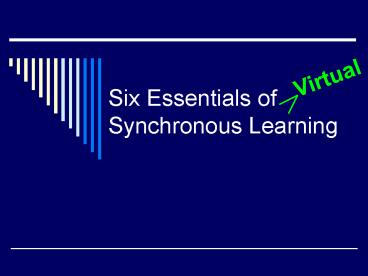Six Essentials of Synchronous Learning - PowerPoint PPT Presentation
1 / 31
Title:
Six Essentials of Synchronous Learning
Description:
The real time interaction of learners with an instructor through electronic means. ... G. Collison, B. Elbaum, S. Haavind, R. Tinker, Atwood Publishing, 2000, p.35. ... – PowerPoint PPT presentation
Number of Views:87
Avg rating:3.0/5.0
Title: Six Essentials of Synchronous Learning
1
Six Essentials of Synchronous Learning
2
Synchronous Learning
- The real time interaction of learners with an
instructor.
3
Virtual Synchronous Learning
- The real time interaction of learners with an
instructor through electronic means.
4
Polling Question 1
- Have you ever presented a live webcast or
synchronous learning session before?
5
Polling Question 2
- If so, what tool(s) have you used?
- Have you used
- Webex Meeting Center (Yes/No)
6
Polling Question 3
- Have you used?
- MS Live Meeting? (Yes/No)
7
Polling Question 4
- Have you used
- Any Synchronous Training Tool such as Interwise,
Webex Trng Center or Elluminate? (Yes/No)
8
Electronic Means
- Virtual Classroom
- (computer VOIP or phone bridge)
- Video conference
- Audio-only conference call
9
Physical Classroom Learning
10
Virtual Classroom Learning
Learner
Content
Teacher
11
Teaching Moment!
- Technology is not learning, in and of itself.
- Rather, it is the enabler to learning and
learning management.
12
All Virtual Learning
- Requires the subtle interplay between
- Content
- The right material for the medium
- Instruction
- The right instructional design and technique
- Technology
- The right tool to support learning and learning
management
13
Exercise 1
- Working as a class, lets identify at least 4
differences between the physical classroom and
the virtual classroom. - If you can think of one, please type in your
response through Direct Messaging to All. - I will record them on the whiteboard.
14
Making the Transition to Virtual
- By learning you will teach
- By teaching you will learn!
15
Exercise 2
- Working in Groups, identify at least 5 skills
you think a virtual classroom instructor needs to
be an effective learning facilitator. - Then we will come back together and share our
thoughts.
16
The Six Essentials
- A Practitioners Perspective
17
Essential Number 1
- Choose the right subject matter.
18
Survey of Instructional Technology
Delivery Method
Instructor- Based
Text-Based
Computer- Based
Web-Based
Adapted from the Media Handbook A Guide to
Selecting, Producing and Using Media by American
Hosp Publishing
Least Efficient Efficient Most
Efficient
19
Essential Number 2
- Think and plan like a broadcaster.
20
Essential Number 3
- Be learner-centered.
21
Virtual Learning Facilitator Roles
FFacilitator SStudent
Facilitating Online Learning, G. Collison, B.
Elbaum, S. Haavind, R. Tinker, Atwood Publishing,
2000, p.35.
22
Essential Number 4
- Be creative, engaging and interactive.
23
Basic Adult Learning Principle
- What I hear, I forget.
- What I see, I remember.
- What I do, I understand.
- --Confucius, 451 BC
24
Common Interactive Tools of the Virtual Classroom
- Polls - Y and N, planned and spontaneous
- Breakout rooms
- Hand raise
- Application share
- Instant message/chat
- Web safari
- Quizzes
- Moderator rights
- Video clips and sounds
25
Desired Outcome
- Use creativity, interactivity and engagement in
measured proportions to support the learning and
to help build a learning community among the
participants.
26
Essential Number 5
- Make participants responsible for their
learning.
27
Exercise 4
- Working as a class, what are at least four ways
an instructor can make learners responsible for
their learning in the virtual classroom? - If you have one, please raise your hand and I
will give you mic privileges.
28
Essential Number 6
- Ask for feedback and be open to learning.
29
Essential Number 6
- (S)he who is afraid to ask is ashamed of
learning!
30
Six Essentials of Synchronous Learning
- Choose the right subject matter.
- Think and plan like a broadcaster.
- Be learner-centered.
- Be creative, engaging and interactive.
- Make participants responsible for their learning.
- Ask for feedback and be open to learning.
31
Questions?































